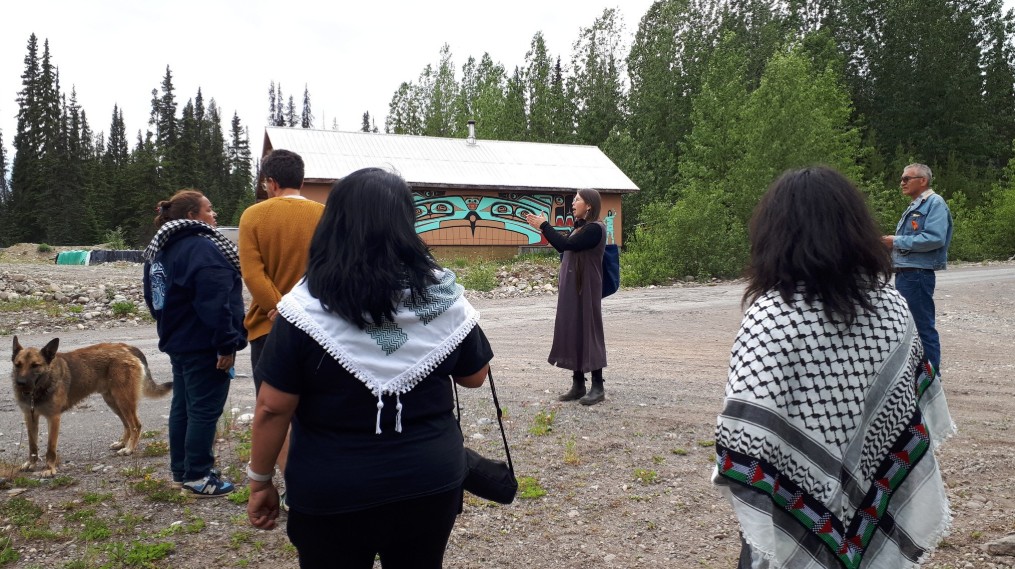PBI-Canada attentive to the risk posed by the G7 critical minerals agenda to Indigenous land and environmental defenders

Video still: Tim Hodgson, the Minister of Energy and Natural Resources Canada, speaks at the conclusion of the G7 meeting in Toronto, October 31, 2025.
The G7 agenda that sees the mining of critical minerals as vital to “shared national and economic security interests” along with the need to “counter China’s dominance in the sector” could pose an emerging new risk to Indigenous rights and to frontline Indigenous land and environmental defenders.
The Canadian Press now reports: “Canada announced on Friday [October 31] the first round of projects under a G7 critical minerals production alliance envisioned as a counterweight to China’s dominance in the sector.”
CBC News further reports: “Canada is [also] officially designating certain critical minerals as a national security priority under the Defence Production Act, a move that would allow the federal government to support the mining industry by guaranteeing it a buyer and a minimum price. The move was announced at a G7 energy and environment meeting in Toronto on Friday, where countries discussed countering China’s overwhelming dominance of critical mineral production.”
Canada’s Energy Minister Tim Hodgson says: “By protecting domestic production under volatile global conditions, we ensure a secure supply of critical minerals to Canadian and allied defence industries.”
This past June, the Canadian government highlighted its commitment to a new NATO Defence Investment Pledge that would see 5% of annual GDP spent on “individual and collective security”. This sets a path for increasing spending on the military from CAD $33.8 billion in 2024-25 to $150 billion a year by 2035.
Critical mineral projects
This backgrounder posted by Natural Resources Canada on October 31, 2025, lists some of the announced first round of “26 new investments and partnerships with 9 allied countries to secure critical minerals supply chains”.
Torngat Metals – Strange Lake Project
CBC News highlights: “Hodgson announced that G7 countries were investing $6.4 billion into 26 critical mineral projects across Canada [including] Torngat Metals’ Strange Lake project in Quebec.”
Naskapi News has reported: “The Naskapi Nation of Kawawachikamach and the Innu Nation worry about [the impact of the mine on] caribou habitat, sacred sites, and uranium-linked contamination. Residents of Sept-Îles have also voiced opposition to uranium waste storage near local water sources.”
That article adds: “The Strange Lake mine would produce heavy rare earth elements such as dysprosium and terbium, vital for renewable technologies—but also for military uses. Greenpeace warns that without binding regulations these materials may be diverted to weapons manufacturing. The mine is majority-owned by Cerberus Capital Management, a U.S. private equity firm with ties to the arms trade. One major client, Vacuumschmelze, supplies parts for F-35 jets, missiles, and other defense systems.”
Nouveau Monde Graphite – Matawinie Mine
The Northern Miner adds: “Nouveau Monde’s US$415-million capex Matawinie mine in Quebec is among the priority projects singled out in Friday’s statement.”
In March 2021, Ricochet Media reported on a blockade organized by the Atikamekw of Manawan First Nation in opposition to this open-pit mining project. That article further noted: “One trucker stepped out of his rig to curse the land defenders, and others pulled on their horn to try to annoy the Atikamekw.”
The role of the United Kingdom
Two weeks prior to this G7 meeting in Toronto, Tim Hodgson, Canada’s minister of energy and natural resources, was in the United Kingdom for meetings on “advancing secure critical minerals supply chains and energy security for Canada and our allies”.
While in London, Hodgson met with Chris McDonald, “the United Kingdom’s Minister for Industry in the Department of Energy Security and Net Zero and newly appointed Envoy for the Critical Minerals Production Alliance”.
The Natural Resources Canada media release also noted: “On the margins of the London Metal Exchange Week, Minister Hodgson met with major mining companies with a strong presence in the United Kingdom and a strong interest in procuring Canadian critical minerals, as well as other key investors from the United Kingdom. The Minister highlighted the opportunities of expanding mining operations in Canada and investing in Canadian critical minerals.”
In this joint policy briefing released on May 15, 2025, seventeen organizations, including Peace Brigades International, warn that the UK government’s drive to secure minerals like cobalt, nickel and lithium could “fuel environmental destruction, human rights abuses and deepen global inequalities.”
Their briefing cautions: “The mining and processing of critical minerals is frequently linked to severe human rights violations including violation of Indigenous rights including the killing of land and environmental defenders.”

Accompaniment
The Peace Brigades International Annual Review 2024 published this past week notes: “This last year also saw our team in Canada begin developing a framework to extend PBI’s protective accompaniment into a ‘Northern’ territory. This transformative proposition would mark a move away from traditional models and start to recognise and address the human rights abuses that threaten us all.”
Photo: PBI-Canada visits Unist’ot’en territory in northern British Columbia, June 2025.

As part of our emerging PBI-Turtle Island initiative, PBI-Canada remains attentive to the relationship between the mining of critical minerals and the risks this poses to the safety and security of land and environmental defenders.
We note that the Global Witness annual report on attacks against land and environmental defenders published in September 2025 documented: “Once again, mining emerged as the deadliest sector, with at least 29 related cases in 2024. Next came logging with eight cases and agribusiness with four. Road-building and infrastructure projects, poaching and hydropower have also driven deadly attacks in 2024.”
The next G7 summit, June 2026
The next G7 Summit is scheduled to be held on June 14-16, 2026, in Évian-les-Bains, Haute-Savoie, France.
The G7 is made up of Canada, France, Germany, Italy, Japan, the United Kingdom, and the United States, as well as the European Union.
We continue to follow this.
Further reading: Why Is the US War Department Buying into a BC Mining Company? (Amanda Follett Hosgood, The Tyee, October 16, 2025).


